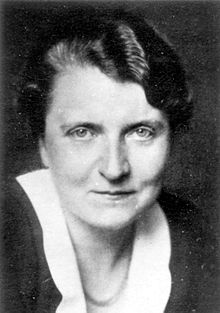Lenka from Koerber
Lenka von Koerber , b. Helene Irmgard Louise von der Leyen (born March 16, 1888 in Niedeck / West Prussia , † July 21, 1958 in Leipzig ) was a German journalist and writer .
Life
Helene Irmgard Louise von der Leyen was born as the daughter of a manor owner. She studied painting in Berlin , married in July 1914 and then moved to London with her husband Egbert von Koerber . With the beginning of the First World War in August 1914, both were forced to return to Germany out of family considerations. Egbert von Koerber was killed in the Battle of the Somme in 1916 . After the First World War she joined the peace movement and from 1918 to 1930 the German Democratic Party . "When the Weimar Constitution gave women formal equality in 1919, she was one of the first to become a lay judge and jury." Lenka von Koerber worked as a volunteer probation officer and advocated a fundamental reform of the prison system . She published her experiences in prison care in newspaper articles and books. The literary weaknesses of the autodidactic writer Lenka von Koerber, who had only completed four school years, and her belief in the will to reform in the German penal system at the time earned her a sharp criticism from Kurt Tucholsky .
Lenka von Koerber went on a trip to Palestine to report on the Jewish settlements; and in 1932, with the support of Clara Zetkin and Nadezhda Konstantinovna Krupskaya, went to the USSR for seven months to find out about the new methods of penal execution in the Soviet Union. She was the first foreign journalist to have access to the prison camps and prisons. Against the background of her experience with the German penal system, she was very impressed by the successes in the social reintegration of prisoners in the Soviet Union based on methods developed by Anton Semenovich Makarenko . Her book "Soviet Russia fights against crime" was published by Rowohlt Verlag in 1933 . The work was banned shortly afterwards burned . In this work, which appeared in London in 1934, she reports on an interview with a Soviet prison guard. When she asked whether there was also dissatisfaction among the prisoners in the Soviet penal system, he replied that there were always a few who were dissatisfied, but that there were very few. The Soviet prison system, however, has unlimited right of appeal for prisoners. Based on her on-site experience in the Soviet Union, she joined the assessment of her English colleague GB Shaw, who also rated the Soviet prison system (GULAG) as extremely pleasant for prisoners, who could stay in prison as long as they wanted (GB Shaw: Rationalization of Russia, pp. 73, 92). Despite the house search and brief detention by the Gestapo , from which she was freed by the intervention of the mayor of Leipzig, Carl Friedrich Goerdeler , she herself had close contact with circles of the resistance.
After the Second World War , Lenka von Koerber became a member of the German Writers' Association and continued her work as a journalist, photographer and writer in Leipzig , where in 1954 she published a portrait book about the St. Thomas Choir and its then Thomas Cantor Günther Ramin . She got involved in her publications in the GDR for young people who had committed criminal offenses and wrote books that were widely recognized, for example about Käthe Kollwitz .
Works
- My experiences among prisoners (Stuttgart, 1928)
- People in prison (Frankfurt / Main, 1930)
- Soviet Russia fights against the crime (Berlin, 1933, banned shortly after)
- Soviet Russia fights crime (London 1934, not banned)
- We sing Bach - The Thomanerchor and its Cantor (Berlin, 1954)
- Lost Youth (Berlin, 1955)
- Agnes walks the narrow path (Schwerin, 1956)
- Experiences with Käthe Kollwitz (Berlin, 1957)
Web links
- Literature by and about Lenka von Koerber in the catalog of the German National Library
- Article by Dieter Götze in Ossietzky 11/2006
- Provocations for tea - portraits of women in Leipzig
- L. v. Koerber's work for young offenders in the GDR
Individual evidence
- ↑ Dieter Götze Archived copy ( memento of the original from June 26, 2010 in the Internet Archive ) Info: The archive link has been inserted automatically and has not yet been checked. Please check the original and archive link according to the instructions and then remove this notice.
- ↑ Tucholsky: Lenka von Koerber, ›People in the Zuchthaus‹ .
- ↑ DNB 574392262
- ↑ DNB 452503159
| personal data | |
|---|---|
| SURNAME | Koerber, Lenka from |
| ALTERNATIVE NAMES | Koerber, Helene von (real name); Leyen, Helene Irmgard Louise von der (maiden name) |
| BRIEF DESCRIPTION | German journalist and writer |
| DATE OF BIRTH | March 16, 1888 |
| PLACE OF BIRTH | Niedeck , West Prussia |
| DATE OF DEATH | July 21, 1958 |
| Place of death | Leipzig |
